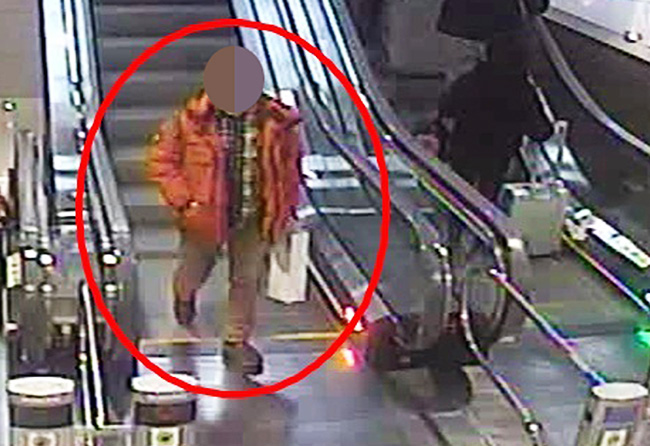- California Assembly OKs highest minimum wage in nation
- S. Korea unveils first graphic cigarette warnings
- US joins with South Korea, Japan in bid to deter North Korea
- LPGA golfer Chun In-gee finally back in action
- S. Korea won’t be top seed in final World Cup qualification round
- US men’s soccer misses 2nd straight Olympics
- US back on track in qualifying with 4-0 win over Guatemala
- High-intensity workout injuries spawn cottage industry
- CDC expands range of Zika mosquitoes into parts of Northeast
- Who knew? ‘The Walking Dead’ is helping families connect
Suspect for fake bomb with memo in Arabic turns out to be Korean

A man, suspected of planting an explosive device in a men’s bathroom at Incheon International Airport, was caught on CCTV camera at the airport. The suspect was arrested in Guro-gu, southwestern Seoul, Wednesday. (Yonhap)

The message, printed in Arabic on half an A4-size sheet of paper, read: “This is the last warning to you. God will punish.” (Yonhap)
By Chung Ah-young
Police have apprehended a suspect who allegedly planted a fake explosive device with a threatening letter written in Arabic at Incheon International Airport.
The Incheon International Airport Police said Thursday that they detained the 36-year-old Korean man, surnamed Yu, at 11:30 p.m., Wednesday, at his home in Guro, Seoul.
The action came five days after he left the package containing a butane gas canister in a men’s bathroom at the airport on Jan. 29.
“Yu admitted that he made the box at home based on methods described in a film, and left it in the restroom,” Chung Sung-chae, head of the airport police, said in a press briefing. “He said he did so out of a grudge toward society.”
The box Yu left contained a butane gas canister for lighters and a bottle of water, which police said was apparently designed to look like an explosive device. There also was a warning written in Arabic, printed on half of an A4-size sheet of paper. It read “This is the last warning to you. God will punish.” Broccoli and a banana peel were also left in the box.
Police said that the suspect majored in music at a graduate school here, but currently has no job. He has no criminal record or history of mental illness. He is married and has a child.
“The suspect said he harbored grievances toward society, and put the box together at his home,” Chung said.
Kwon Yong-seok, a chief police officer of the Incheon Metropolitan Police Agency, said that Yu claimed he didn’t have any intention to actually explode it.
“The suspect claimed that he felt angry because he was jobless and had no money,” he said.
Yu told police that he used a Google translation service for writing the memo in
Arabic.
“After investigating further details of his crime, we will request the prosecution to seek an arrest warrant for making threats using an explosive device,” Kwon said.
Police tracked him down after narrowing down 762 people who were captured by surveillance cameras using the restroom. In the camera footage, they found Yu entering the restroom with a heavy paper bag and leaving the place with an empty one at around 3:30 p.m.
Police investigation originally focused on the possibility of a Muslim terrorist organization’s involvement after the Arabic memo was found.
However, experts raised questions over the memo as it had grammatical errors and it used awkward expressions. It also did not include phrases usually found in threatening messages, such as sentences from the Koran or use of the term, “in the name of Allah.”
















